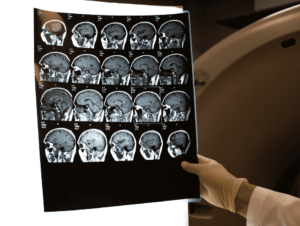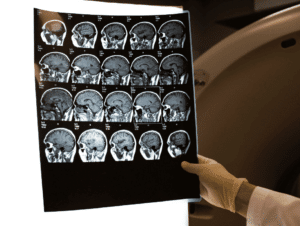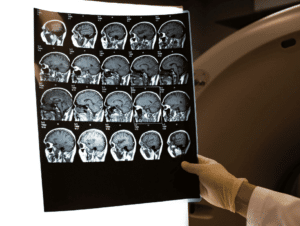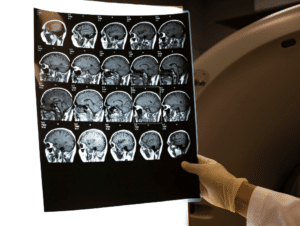
Contact Us

At Neurotherapeutix, our fMRI-guided TMS therapy treats a wide range of psychiatric conditions, neurodevelopmental disorders, and neurological diseases. This innovative, non-invasive therapy provides targeted relief where traditional treatments may not have succeeded. Learn how our approach can help manage your condition below.

Insomnia involves difficulty falling or staying asleep, leading to fatigue, cognitive impairments, and mood disturbances. TMS therapy helps regulate sleep-wake cycles by targeting brain areas associated with sleep regulation, improving sleep quality and overall well-being.
CONDITIONS
READ MORE
PTSD can develop after trauma and involves flashbacks, nightmares, and severe anxiety. TMS therapy targets areas of the brain associated with fear and emotional regulation, helping patients manage trauma-related symptoms and restore emotional balance.
CONDITIONS
READ MORE
ADHD is a neurodevelopmental disorder that affects focus, hyperactivity, and impulse control. Diagnosis often occurs in childhood but can persist in adulthood. Symptoms may include frequent switching of tasks, hyperfocusing on one task, difficulty paying attention, and inability to sit still.
CONDITIONS
READ MORE
Phobias can cause overwhelming fear and avoidance, making daily life difficult. fMRI-guided TMS therapy targets the brain circuits responsible for fear responses, helping to reduce excessive fear and improve emotional regulation. If traditional treatments haven’t worked, explore how TMS therapy can provide lasting relief. Read more.
CONDITIONS
READ MORE
Schizophrenia is a severe mental disorder characterized by hallucinations, delusions, and disorganized thinking. TMS therapy helps regulate brain circuits involved in perception and thought processes, offering relief from psychotic symptoms, and helping individuals manage the complexities of this condition.
CONDITIONS
READ MORE
Asperger’s Syndrome, a form of autism spectrum disorder, affects social interactions, communication, and behavior. Our fMRI-guided TMS therapy targets brain connectivity issues to improve social cognition, executive function, and emotional regulation. If you’re seeking an advanced, non-invasive approach, explore how TMS therapy can support meaningful improvements. Read more.
CONDITIONS
READ MORE
Fibromyalgia causes widespread pain, fatigue, and cognitive disruptions, often without a clear physical cause. At Neurotherapeutix, we take a neurological approach to this complex condition. Using fMRI-guided TMS therapy, we precisely target brain regions involved in pain perception and emotional regulation. This advanced, non-invasive treatment helps reduce symptoms like chronic pain, brain fog, and low mood.
CONDITIONS
READ MORE
ALS affects the nerves that control voluntary movement, gradually leading to muscle weakness and loss of function. At Neurotherapeutix, we offer fMRI-guided TMS therapy to help manage symptoms and support quality of life through targeted, brain-based care.
CONDITIONS
READ MORE
Essential tremor is a neurological condition that causes involuntary shaking, most often in the hands, and can interfere with basic activities like writing, eating, or speaking. At Neurotherapeutix, we offer non-surgical fMRI-guided TMS therapy to help regulate the brain’s motor circuits and reduce tremor symptoms.
CONDITIONS
READ MORE
Chronic pain is a complex condition that often persists beyond the expected healing period and may not respond to traditional treatment. At Neurotherapeutix, we use fMRI-guided TMS therapy to identify and target the specific brain regions involved in pain perception. This non-invasive approach can help reduce pain intensity, improve function, and restore quality of life, especially for those who haven’t found relief elsewhere.
CONDITIONS
READ MORE
Frontotemporal dementia (FTD) is a progressive neurodegenerative disease that affects personality, behavior, language, and motor function. Unlike Alzheimer’s disease, which primarily impacts memory, FTD tends to occur earlier in life and often leads to profound changes in judgment, communication, and emotional regulation.
CONDITIONS
READ MORE
Following neurosurgical procedures, individuals may experience sequelae, or complications. These may be sequelae if a patient experiences new or worsening symptoms following surgery. Understanding these potential outcomes and seeking appropriate care are crucial aspects of recovery.
CONDITIONS
READ MORE
Concussions result from trauma to the brain, often caused by high-impact sports like football, boxing, or hockey. These injuries can lead to cognitive and emotional disturbances. TMS therapy supports recovery by stimulating brain regions involved in healing, helping to reduce symptoms such as memory loss, mood swings, and difficulty concentrating.
CONDITIONS
READ MORE
Preventing cognitive decline is a proactive approach that includes lifestyle choices and targeted interventions aimed at reducing the risk of conditions such as Alzheimer’s disease and other age-related cognitive impairments. At Neurotherapeutix, we use advanced fMRI-guided TMS therapy to strengthen brain networks and maintain cognitive functioning as patients age.
CONDITIONS
READ MOREBy stimulating specific brain regions, our TMS therapy helps preserve memory and cognitive vitality, enabling individuals to take preventative action against neurological disorders. This treatment approach addresses current symptoms and serves as a preventive strategy to support long-term brain health.
Taking steps to reduce risk factors and enhance brain resilience is crucial for maintaining mental sharpness as we age. If you have any questions or would like to explore how our therapy can help you or a loved one, our clinicians are here to assist you.
Whether you're dealing with a long-term disorder or seeking relief where traditional methods have not worked, we are here to help.
Explore the conditions we treat in more detail and take the first step toward improving your quality of life. Contact us today to schedule a consultation or learn more about how our personalized approach can benefit you.